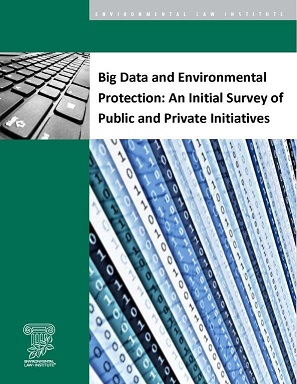Managing ESG Disclosures: Q&A with Cassie Phillips of the Environmental Law Institute
Over the years, the conversation around ESG disclosures—company information serving the dual goals of transparency and corporate social responsibility—has transitioned from one focusing on whether to disclose to one focusing on how to disclose. Last October, a coalition of investors, academics, and organizations petitioned the U.S. Securities and Exchange Commission to undertake notice and comment rulemaking to develop a comprehensive framework that will ensure the relevance, reliability, and usefulness of ESG disclosures. This December 2018 special report of Thomson Reuter'sWestlaw Journal Automotive features an interview with Cassie Phillips, director of ELI's Private Environmental Governance Initiative. In it, she discusses a less prominent, but equally important, aspect of ESG disclosures: legal risk. Read it here.
Big Data and Environmental Protection: An Initial Survey of Public and Private Initiatives
 Big data sets and analytics increasingly are being used by government agencies, non-governmental organizations, and private firms to forward environmental protection. Improving energy efficiency, promoting environmental justice, tracking climate change, and monitoring water quality are just a few of the objectives being furthered by the use of big data. This paper provides examples of the many ways big data sets and analytics are being used to achieve environmental and sustainability goals. These examples are not intended to provide a comprehensive list of all efforts underway, but rather to illustrate the range of initiatives and approaches being used by government agencies, non-governmental organizations, and private firms.
Big data sets and analytics increasingly are being used by government agencies, non-governmental organizations, and private firms to forward environmental protection. Improving energy efficiency, promoting environmental justice, tracking climate change, and monitoring water quality are just a few of the objectives being furthered by the use of big data. This paper provides examples of the many ways big data sets and analytics are being used to achieve environmental and sustainability goals. These examples are not intended to provide a comprehensive list of all efforts underway, but rather to illustrate the range of initiatives and approaches being used by government agencies, non-governmental organizations, and private firms.
This white paper builds off of ELI's October 22, 2013 event, Big Data: A Game Changer for Environmental Managers, Advocates and Regulators? This white paper is the first of three publications by the authors on the subject of Big Data. Lookout for Big Data and the Environment: A Survey of Initiatives and Observations Moving Forward in a forthcoming issue of the Environmental Law Reporter, and Big Data — Enabling Big Protection for the Environment, in the forthcoming book Big Data, Big Challenges in Evidence-Based Policy Making (West Publishing), and check back here for updates!
Environmental Law Reporter Special Issue on Private Environmental Governance, February 2014
A Summit on Private Environmental Governance: Facing the Challenges of Voluntary Standards, Supply Chains, and Green Marketing, Deborah P. Majoras
The Emergence of Private Environmental Governance, Michael P. Vandenbergh
Private Governance of Green Claims in the Marketplace: The Role of NAD and Advertising Self-Regulation, David G. Mallen
Marine Stewardship Council: A Case Study in Private Environmental Standard-Setting, Will Martin
Interviews With Private Governance Experts, Linda Breggin
Why Benefit Corps May Matter, Linda Breggin, The Environmental Forum (July/August 2013)
Other Publications
Gold Standard for Sustainable Aquaculture Ecolabel Design (Environmental Law Institute and The Ocean Foundation, December 2008)
- Summary Report
- Technical Report
- Gold Standard Evaluation: Whole Foods Market Aquaculture Purchasing Standards
- Appendix: Descriptions of Food Labeling Programs
The Environmental Law Institute (ELI) and The Ocean Foundation (TOF) have carried out the first evaluation of the farmed seafood purchasing standards recently released by the Whole Foods Market grocery chain. The evaluation compared the Whole Foods purchasing standards against the Gold Standard for Aquaculture Ecolabel Design. ELI and TOF found that the retailer is taking commendable steps to reduce the environmental and social impacts of fish and shrimp farming, or aquaculture, but also identified some weaknesses and offered several clear steps to improve the standards.
Harnessing Consumer Power: Using Certification Systems to Promote Good Governance explores how certification mechanisms that have been used previously to promote environmental and social sustainability can be applied to advance transparent and democratic government processes, reduce corruption, and promote peace. Certification systems may be designed to directly cut off major sources of revenue for armed conflict or to indirectly improve environmental and social sustainability such as ecotourism certification. Highlighting the current international certification systems
This report analyzes the current state of several specific types of environmental liability and how managers might react to information about potential environmental liability. The report then describes the management and accounting systems typically used to provide managers with information to be used in decision making and analyzes how information about liability is used in the various management systems and identifies some problems with the way this information is used by management. The report concludes with recommendations for improvements in how lawyers and managers communicate and use information about environmental liabilities.
Environmental Gatekeeping in State Laws (Environmental Law Institute, December 1991)
This report explores the use of “gatekeeper” mechanisms as a means of enhancing the effectiveness of state environmental programs. A gatekeeper is an independent third party who is enlisted by the government to assure that regulated entities properly perform under a regulatory scheme. Several existing and one proposed state environmental gatekeeping mechanisms are described and analyzed, ranging from certifying toxic use reduction plans to managing the cleanup of hazardous waste sites